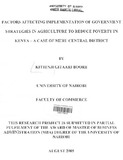| dc.description.abstract | Strategies are a critical element in institutional functioning, but whereas most organisations have good
strategies, successful implementation remains a major challenge. The notion of strategy
implementation might seem quite straightforward, but transforming strategies into action is a far more
complex, difficult and challenging undertaking than one would assume.
This objective of this study was to establish and document factors that affect implementation of
government strategies in agriculture to reduce poverty in Kenya. The findings of the study indicate that
the government as the implementing agency, the extension officers as the strategy implementers and
the farmers as the beneficiary, all have a role to play if strategy implementation is to result in reduced
poverty levels. All the three play an important role in strategy implementation, and challenges in
strategy implementation emanate from these three sources. Inadequate human, physical, financial and
technological resources were established to be the main barrier limiting implementation of government
strategies. Low morale and an organisational culture not supportive of strategy implementation was the
main factor affecting extension workers, while low farmer perceptions and decreasing agricultural land
sizes was found to be the limiting factor with farmers.
A number of recommendations have been put forward to address the situation. The government should
increase its budgetary allocation to agriculture, enact policies that effectively regulate the sector, put in
place staff training and development programme, develop an effective monitoring and evaluation
system that links performance to rewards and improve rural infrastructure. All the stakeholders at the
district level should harmonise their activities and have a common front in approaching farmers'
challenges. The gap between research and extension should be bridged to bring information and
technology to farmers, and the community should be involved during strategy formulation and
implementation. The strategies implemented should have sustainability in mind and should be holistic
to cover the major challenges faced by farmers.
Lastly, the research puts forward recommendations for further research, in order to shed more light on
the factors that hinder development of the agricultural sector in Kenya and consequently poverty
reduction. | en |

